Otro día y dos películas más de la sección oficial exhibidas.
Angelina Jolie arrivó triunfante junto a Clint Eastwood para presentar The Changeling, o The Exchange, al parecer todavía no se deciden por un título definitivo.
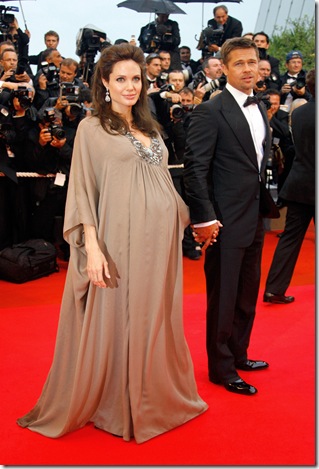

Ambos tienen razones de sobra para celebrar. La película hasta ahora ha sido una de las de mejor acogida, llegando a comparar su visión decadente del Los Angeles corrupto observado en obras maestras como Chinatown, y la prensa se deshace en elogios para Angelina, llamando su actuación una verdadera revelación. En su papel de ser la mitad de Brangelina y ser la mujer más famosa y perseguida del mundo, la gente a veces olvida su enorme talento como actriz, culpa en parte de ella misma por sus cuestionables elecciones en el pasado...hasta ahora:
"A thematic companion piece to Mystic River but more complex and far-reaching, The Exchange impressively continues Clint Eastwood’s great run of ambitious late-career pictures. Emotionally powerful and stylistically sure-handed, this true story-inspired drama begins small with the disappearance of a young boy, only to gradually fan out to become a comprehensive critique of the entire power structure of Los Angeles, circa 1928. Graced by a top-notch performance from Angelina Jolie, the Universal release looks poised to do some serious business upon tentatively scheduled opening late in the year." -- Variety.
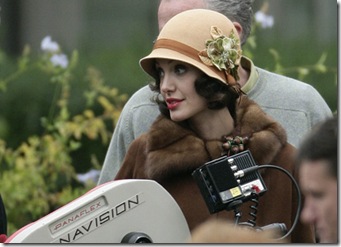 "For only the second time in his filmmaking career, Clint Eastwood's celebration of the loner who bucks the system, the "cowboy" who demands justice without concern for personal jeopardy, settles on a heroine. Like Hilary Swank's boxer in "Million Dollar Baby," Angelina Jolie's single mother, Christine Collins, takes every punch thrown at her and comes back fighting. Her combat is not in a boxing ring -- where fighting is supposed to take place -- but rather in a corrupt police department, psychiatric ward and the court of justice where she demands to know one thing: What happened to her son? Jolie completely shuns her movie star image to play a woman whose confidence in everything she thinks she knows is shaken to its very core. She can appear vulnerable and steadfast in the same moment. This woman has a depth she herself has never explored." -- The Hollywood Reporter.
"For only the second time in his filmmaking career, Clint Eastwood's celebration of the loner who bucks the system, the "cowboy" who demands justice without concern for personal jeopardy, settles on a heroine. Like Hilary Swank's boxer in "Million Dollar Baby," Angelina Jolie's single mother, Christine Collins, takes every punch thrown at her and comes back fighting. Her combat is not in a boxing ring -- where fighting is supposed to take place -- but rather in a corrupt police department, psychiatric ward and the court of justice where she demands to know one thing: What happened to her son? Jolie completely shuns her movie star image to play a woman whose confidence in everything she thinks she knows is shaken to its very core. She can appear vulnerable and steadfast in the same moment. This woman has a depth she herself has never explored." -- The Hollywood Reporter.
"Quite simply, Clint Eastwood's new film Changeling is flawless, with Clint proving yet again that he is the true master of the great American film. Early next year, it's safe to say that Changeling will be in the Academy frame itself, when the 2008 nominations are announced, with likely places in the Best Picture, Best Actress, Best Supporting Actor (for John Malkovich as Christine's champion), Best Screenplay and Best Score, for the haunting theme penned by Clint himself. No praise is too high for this thoughtful, engrossing, intelligent film. Brilliant, brilliant, brilliant." -- Empire.
Esta es la quinta visita de Clint Eastwood a Cannes, y esta vez seguro no se va con las manos vacías.
La otra película de la sección official exhibida fue Delta, del autor húngaro Kornél Mundruczó.
Esta película parece redefinir la frase "cine contemplativo." Esta es la descripción de la crítica de Entertainment Weekly, Lisa Schwarzbaum:
"This one's about a nearly mute, possibly saintly, or possibly just simpleton young woman who sets up incestuous house with her equally nearly mute, possibly saintly, or possibly just simpleton half-brother on a remote outpost of a reedy Hungarian waterway. The two stare at the sky, or at a turtle, or at a chunk of bread, until brutish, outraged, drunken locals put an end to the two of them. The end."
El actor Felix Lajko, la actríz Lili Monori, el director Kornél Mundruczó y la actríz Orsi Toth.
"Five years after launching the project and 18 months after starting to shoot it, with one tragic accident in the middle which almost sunk the entire production (the death of lead actor, Lajos Bertok, to whom the film is dedicated), Kornel Mundruczo is back on his feet with his best rounded and most mature work to date. The themes he has been associated with in the past are now integrated in a perfectly coherent world and it seems as if he has found his own individual voice and a style he is most comfortable with, facts attested by the Best Film Award and the Gene Moskovitz prize offered by the foreign press, which he collected at the Hungarian Film Week." -- Screendaily.
Fuera de competencia se presentaron dos de los documentales más esperados, ambos inspirados por dos figuras icónicas: Roman Polanski: Wanted and Desired y Maradona.
El documental de Marina Zenovich, Roman Polanski: Wanted and Desired, al parecer relata de manera equilibrada los hechos definitivos de la vida de Polanski, desde su familia muerta en un campo de concentración judío, el asesinato de su esposa embarazada Sharon Tate por la familia Manson, y el crímen que cometió por el que aún se mantiene prófugo de la justicia norteamericana:
“Marina Zenovich's thoroughly researched and beautifully crafted documentary revisits the case and introduces new evidence that suggests a gross miscarriage of justice. It's a compelling tale that should be a natural for film savvy cable outlets. Zenovich does not argue that what Polanski did to 13-year-old Samantha Geimer was right, but she does present a compelling case that he was not treated fairly by the judicial system, especially by his trial judge, Laurence Rittenband. It's a complex story with many moving parts, and Zenovich gives context to the main drama by referencing Polanski's horrendous childhood fleeing the Nazis in Poland and the death of his mother in a prison camp.” -- The Hollywood Reporter.
Maradona y Emir Kusturica fantasmean en el photocall.
El futbol es una religión y son pocas de sus figuras las que provocan tantas pasiones como Diego Armando Maradona. El celebrado dos veces ganador de la Palma de Oro Emir Kusturica visita Cannes por sexta ocasión, esta vez fuera de competencia, para presentar este documental sobre el hombre y la leyenda, en el que al parecer el mismo Kusturica termina dándose más protagonismo que su objeto de estudio:
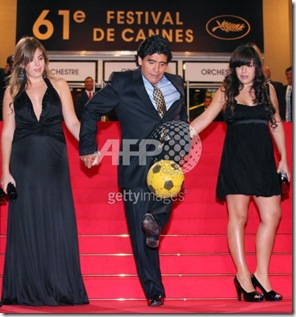 "This video-shot film, which Kusturica started in 2005, is an undisciplined, uncritical and (most unforgivably) un info rmative picture of a legend, by a man who clearly thinks he's something of a legend himself. The film equivalent of one of those photos in which fans gets to throw an arm round a hero's shoulders, Maradona By Kusturica should have theatrical life in select showcases, simply because of the enduring veneration in which the former footballer is held worldwide; Kusturica's own flagging auteur cachet may help, but it certainly won't be the main appeal" -- Screendaily.
"This video-shot film, which Kusturica started in 2005, is an undisciplined, uncritical and (most unforgivably) un info rmative picture of a legend, by a man who clearly thinks he's something of a legend himself. The film equivalent of one of those photos in which fans gets to throw an arm round a hero's shoulders, Maradona By Kusturica should have theatrical life in select showcases, simply because of the enduring veneration in which the former footballer is held worldwide; Kusturica's own flagging auteur cachet may help, but it certainly won't be the main appeal" -- Screendaily.
"This loosely-structured documentary portrait of the beleaguered football legend bears out the suspicions suggested by its title: Maradona By Kusturica is indeed practically a large order of Kusturica with a side salad of Maradona."
Tweet this!
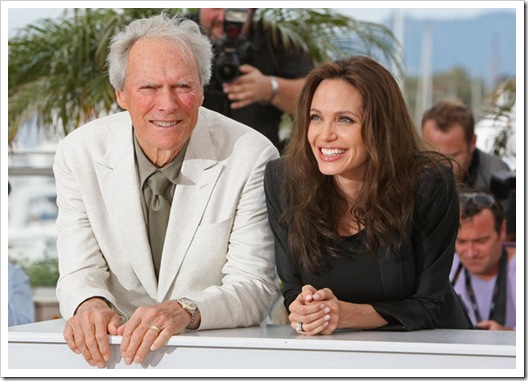

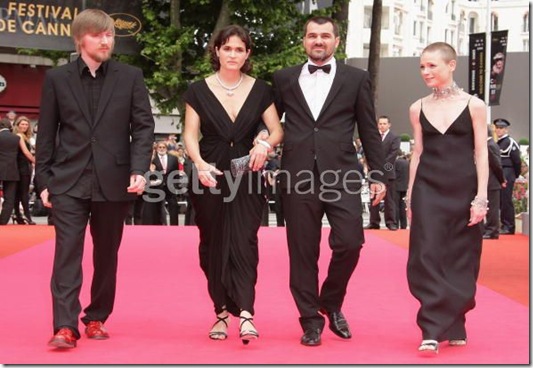
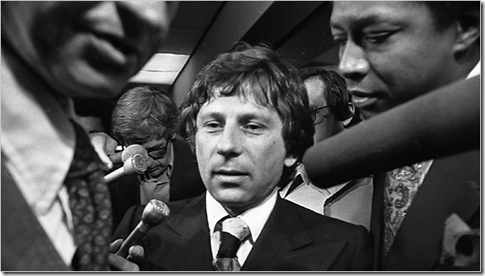








No comments:
Post a Comment